外研版(2019)选择性必修 第一册Unit 2 Onwards and upwards Using language课件(共20张)
文档属性
| 名称 | 外研版(2019)选择性必修 第一册Unit 2 Onwards and upwards Using language课件(共20张) |  | |
| 格式 | pptx | ||
| 文件大小 | 1.6MB | ||
| 资源类型 | 教案 | ||
| 版本资源 | 外研版(2019) | ||
| 科目 | 英语 | ||
| 更新时间 | 2024-11-16 15:37:03 | ||
图片预览

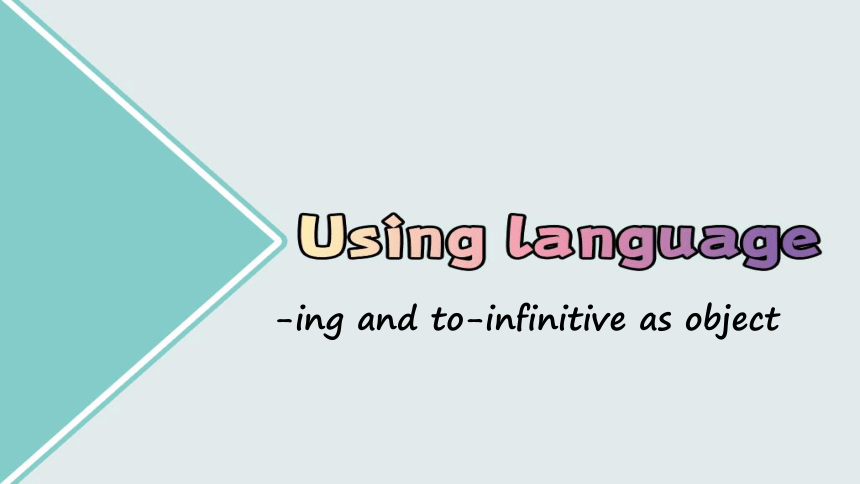

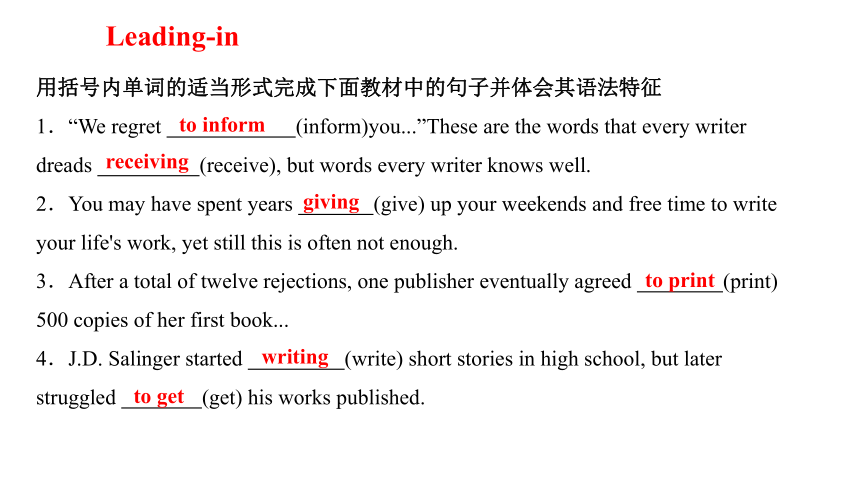
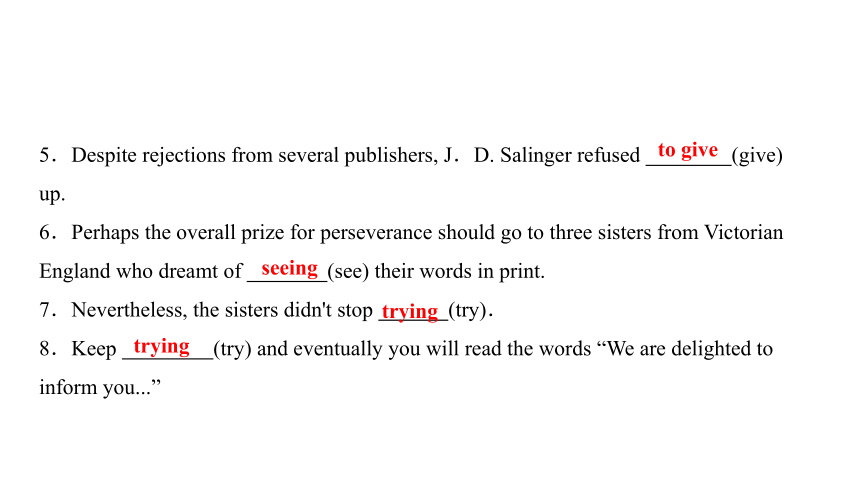
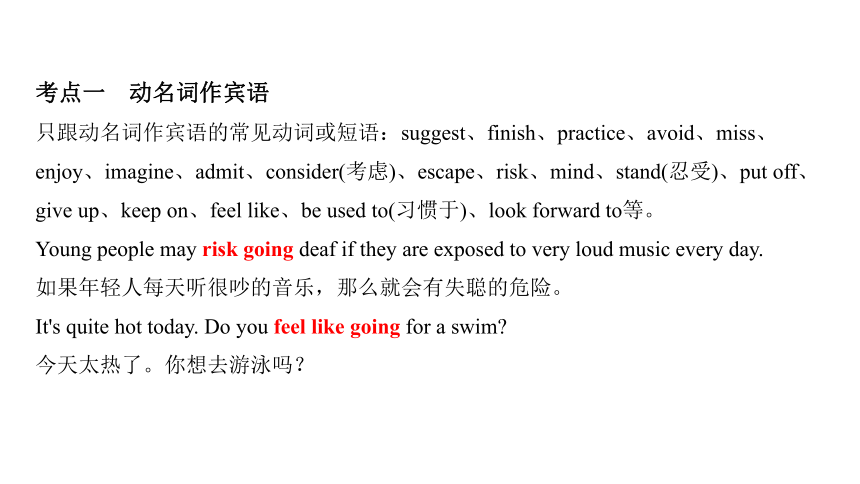
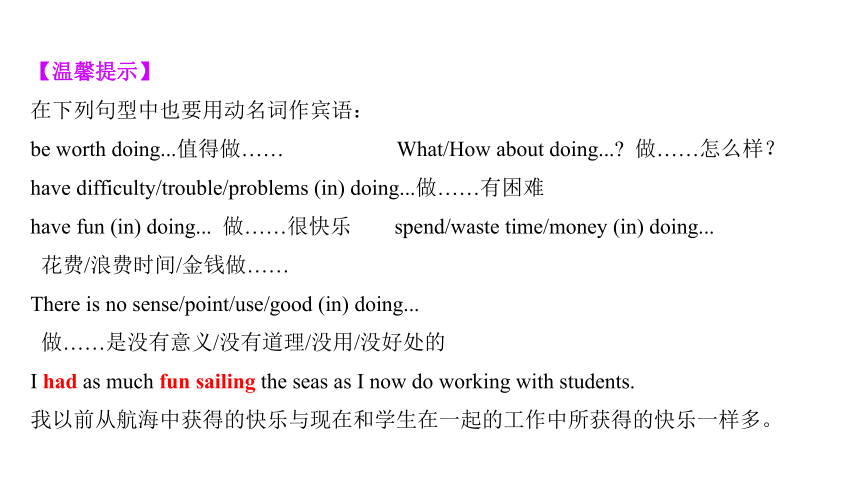
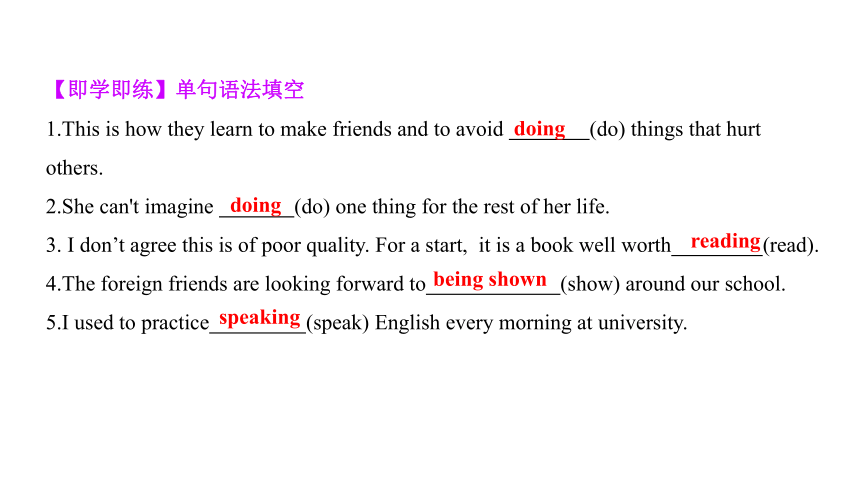
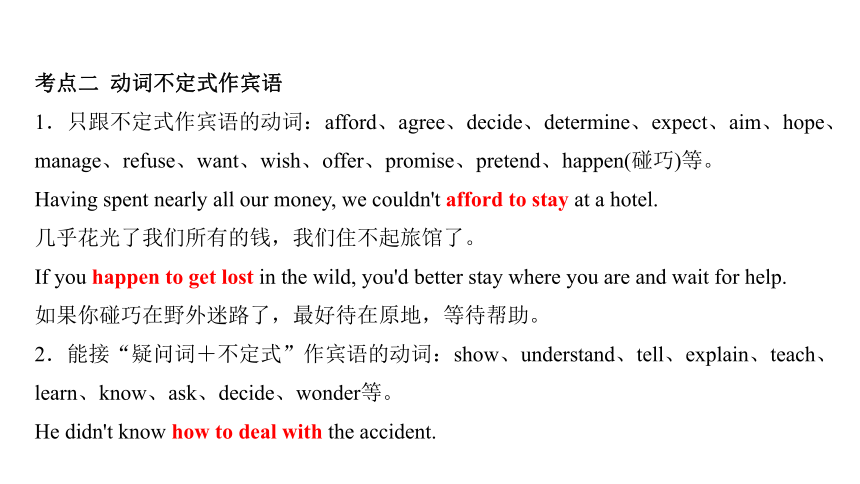
文档简介
(共20张PPT)
Onwards and upwards
-ing and to-infinitive as object
1.To understand the general knowledge of -ing and to-infinitive as object
2. To be able to use -ing and to-infinitive as object in proper situations.
Learning aims
用括号内单词的适当形式完成下面教材中的句子并体会其语法特征
1.“We regret (inform)you...”These are the words that every writer dreads (receive), but words every writer knows well.
2.You may have spent years (give) up your weekends and free time to write your life's work, yet still this is often not enough.
3.After a total of twelve rejections, one publisher eventually agreed (print) 500 copies of her first book...
4.J.D. Salinger started (write) short stories in high school, but later struggled (get) his works published.
Leading-in
to inform
receiving
giving
to print
writing
to get
5.Despite rejections from several publishers, J.D. Salinger refused (give) up.
6.Perhaps the overall prize for perseverance should go to three sisters from Victorian England who dreamt of (see) their words in print.
7.Nevertheless, the sisters didn't stop (try).
8.Keep (try) and eventually you will read the words “We are delighted to inform you...”
to give
seeing
trying
trying
考点一 动名词作宾语
只跟动名词作宾语的常见动词或短语:suggest、finish、practice、avoid、miss、enjoy、imagine、admit、consider(考虑)、escape、risk、mind、stand(忍受)、put off、give up、keep on、feel like、be used to(习惯于)、look forward to等。
Young people may risk going deaf if they are exposed to very loud music every day.
如果年轻人每天听很吵的音乐,那么就会有失聪的危险。
It's quite hot today. Do you feel like going for a swim
今天太热了。你想去游泳吗?
【温馨提示】
在下列句型中也要用动名词作宾语:
be worth doing...值得做…… What/How about doing... 做……怎么样?
have difficulty/trouble/problems (in) doing...做……有困难
have fun (in) doing... 做……很快乐 spend/waste time/money (in) doing...
花费/浪费时间/金钱做……
There is no sense/point/use/good (in) doing...
做……是没有意义/没有道理/没用/没好处的
I had as much fun sailing the seas as I now do working with students.
我以前从航海中获得的快乐与现在和学生在一起的工作中所获得的快乐一样多。
【即学即练】单句语法填空
1.This is how they learn to make friends and to avoid (do) things that hurt others.
2.She can't imagine (do) one thing for the rest of her life.
3. I don’t agree this is of poor quality. For a start, it is a book well worth (read).
4.The foreign friends are looking forward to (show) around our school.
5.I used to practice (speak) English every morning at university.
doing
doing
reading
being shown
speaking
考点二 动词不定式作宾语
1.只跟不定式作宾语的动词:afford、agree、decide、determine、expect、aim、hope、manage、refuse、want、wish、offer、promise、pretend、happen(碰巧)等。
Having spent nearly all our money, we couldn't afford to stay at a hotel.
几乎花光了我们所有的钱,我们住不起旅馆了。
If you happen to get lost in the wild, you'd better stay where you are and wait for help.
如果你碰巧在野外迷路了,最好待在原地,等待帮助。
2.能接“疑问词+不定式”作宾语的动词:show、understand、tell、explain、teach、learn、know、ask、decide、wonder等。
He didn't know how to deal with the accident.
【即学即练】单句语法填空
1.I had hoped (send) him a telegram to congratulate him on his marriage, but I didn’t manage it.
2.Having failed in the driving test twice, he decided (not take) it again.
3. He gave us some advice on how (learn) English.
4.After they graduated from university, they determined (cycle) along the entire river.
5.You didn't happen (know) his name, do you
to send
not to take
to learn
to cycle
to know
考点三 既可接动名词又可接不定式的动词
1.hate、 like、 love、prefer后接动名词作宾语,表示习惯性或经常性的行为;若表示特定的、具体的或一次性的活动时则多用不定式作宾语。begin、start、continue等后接不定式或动名词作宾语时意义差别不大。
They prefer staying indoors when it is cold.
天冷时他们喜欢待在屋里。
Would you prefer to stay at home or go to the movies with us this evening
今晚你想待在家里还是和我们一起去看电影呢?
Tom began to learn/learning how to use a computer.
汤姆开始学习如何使用电脑。
2.有些动词既可接不定式也可接动名词作宾语,而且意义差别很大。
(1)try to do...(尽力做……);try doing...(试着去做……);
(2)mean to do...(打算做……);mean doing...(意味着做……);
(3)regret to do...(遗憾要去做……);regret doing...(后悔做过……);
(4)remember to do...(记得去做……);remember doing...(记得做过……);
(5)forget to do...(忘记去做……);forget doing...(忘记做了……)
The teacher regretted to tell Tom he didn't pass the exam, and Tom regretted not studying hard.
老师遗憾地告诉汤姆他没通过考试,汤姆后悔没有努力学习。
【即学即练】单句语法填空
1.We regret (inform) you that we cannot admit the manuscript into the formal peer review process.
2.I remembered (lock) the door before I left the office, but forgot (turn) off the lights.
3.I’m determined to solve this mystery even if it means (travel) to New York by myself.
4.I don't like basketball, but I like basketball this afternoon.(play)
to inform
to lock
to turn
traveling
playing
to play
3.动词allow、advise、forbid、permit后直接跟动名词形式作宾语,如果动词后面有名词或代词作宾语,其后用动词不定式作宾语补足语。即“allow/advise/forbid/permit sb. to do sth.”。
My parents don't allow smoking in our house.
我父母不允许在家里抽烟。
My parents don't allow me to smoke in our house.
我父母不允许我在家里抽烟。
【即学即练】单句语法填空
His wife doesn't allow inside the room but allows him outside the room.(smoke)
smoking
to smoke
4.need、require、want、demand表示“需要”时,后面接动名词,表示被动含义,相当于接不定式的被动形式(to be done)。有类似用法的还有deserve(值得;应该)。
The condition of this car is so serious. It really needs repairing/to be repaired before driving on the road again.
这辆车的状况是如此糟糕,它再次上路前确实需要维修一下。
【即学即练】单句语法填空
If you do wrong, you deserve (punish) for what you do.
punishing/to be punished
Summary
-ing/to do作宾语
1.只跟动名词作宾语的常见动词或短语:
suggest、finish、practice、avoid、miss、enjoy、imagine、admit、consider、escape、risk、mind、stand、put off、give up、keep on、feel like、be used to、look forward to,etc.
2.只跟不定式作宾语的动词:
afford、agree、decide、determine、expect、aim、hope、manage、refuse、want、wish、offer、promise、pretend、happen, etc.
3.既可接动名词又可接不定式的动词:
(1)like、hate、prefer (2)start、begin、continue
(3)allow、advise、forbid、permit (4)need、require、want、demand
Ⅰ单句语法填空
1. I didn't mean (eat) anything but the ice cream looked so good that I couldn't
help (try) it.
2. —Remember (return) the book to me.
—But I remember (return) it to you.
3.I heard a passenger behind me shouting to the driver, but he refused (stop) until we reached the next stop.
4. The doctor tried (cure) the woman of her illness, so he tried (treat) her with a new medicine.
to eat
returning
trying
to return
to stop
to cure
treating
5. You have had a good start, but more work needs (do) to achieve the goals you want.
6.As she is looking forward to (hear) from me,please remember (post) this letter on your way to school.
7. She didn't mind her books (take) away and used by other students.
8. After receiving the Oscar for Best Actress, Anne went on (thank) all the people who had helped in her career.
to post
being taken
hearing
to thank
doing/to be done
Ⅱ.完成句子
1.他离开教室的时候,忘记了关灯。
He when he left the classroom.
2.我遗憾地告诉你,所有的票都卖光了。
that all the tickets have been sold out.
3.我永远不会忘记第一次看见长城的情景。
I shall never forget for the first time.
4. 他10岁时就开始学英语。
He at the age of ten.
forgot to turn off the lights
I regret to tell you
seeing the Great Wall
began learning/to learn English
Success is won by three things:first,effort;second,more effort;third,still more effort.
成功要靠三件事才能赢得:努力,努力,再努力。
Onwards and upwards
-ing and to-infinitive as object
1.To understand the general knowledge of -ing and to-infinitive as object
2. To be able to use -ing and to-infinitive as object in proper situations.
Learning aims
用括号内单词的适当形式完成下面教材中的句子并体会其语法特征
1.“We regret (inform)you...”These are the words that every writer dreads (receive), but words every writer knows well.
2.You may have spent years (give) up your weekends and free time to write your life's work, yet still this is often not enough.
3.After a total of twelve rejections, one publisher eventually agreed (print) 500 copies of her first book...
4.J.D. Salinger started (write) short stories in high school, but later struggled (get) his works published.
Leading-in
to inform
receiving
giving
to print
writing
to get
5.Despite rejections from several publishers, J.D. Salinger refused (give) up.
6.Perhaps the overall prize for perseverance should go to three sisters from Victorian England who dreamt of (see) their words in print.
7.Nevertheless, the sisters didn't stop (try).
8.Keep (try) and eventually you will read the words “We are delighted to inform you...”
to give
seeing
trying
trying
考点一 动名词作宾语
只跟动名词作宾语的常见动词或短语:suggest、finish、practice、avoid、miss、enjoy、imagine、admit、consider(考虑)、escape、risk、mind、stand(忍受)、put off、give up、keep on、feel like、be used to(习惯于)、look forward to等。
Young people may risk going deaf if they are exposed to very loud music every day.
如果年轻人每天听很吵的音乐,那么就会有失聪的危险。
It's quite hot today. Do you feel like going for a swim
今天太热了。你想去游泳吗?
【温馨提示】
在下列句型中也要用动名词作宾语:
be worth doing...值得做…… What/How about doing... 做……怎么样?
have difficulty/trouble/problems (in) doing...做……有困难
have fun (in) doing... 做……很快乐 spend/waste time/money (in) doing...
花费/浪费时间/金钱做……
There is no sense/point/use/good (in) doing...
做……是没有意义/没有道理/没用/没好处的
I had as much fun sailing the seas as I now do working with students.
我以前从航海中获得的快乐与现在和学生在一起的工作中所获得的快乐一样多。
【即学即练】单句语法填空
1.This is how they learn to make friends and to avoid (do) things that hurt others.
2.She can't imagine (do) one thing for the rest of her life.
3. I don’t agree this is of poor quality. For a start, it is a book well worth (read).
4.The foreign friends are looking forward to (show) around our school.
5.I used to practice (speak) English every morning at university.
doing
doing
reading
being shown
speaking
考点二 动词不定式作宾语
1.只跟不定式作宾语的动词:afford、agree、decide、determine、expect、aim、hope、manage、refuse、want、wish、offer、promise、pretend、happen(碰巧)等。
Having spent nearly all our money, we couldn't afford to stay at a hotel.
几乎花光了我们所有的钱,我们住不起旅馆了。
If you happen to get lost in the wild, you'd better stay where you are and wait for help.
如果你碰巧在野外迷路了,最好待在原地,等待帮助。
2.能接“疑问词+不定式”作宾语的动词:show、understand、tell、explain、teach、learn、know、ask、decide、wonder等。
He didn't know how to deal with the accident.
【即学即练】单句语法填空
1.I had hoped (send) him a telegram to congratulate him on his marriage, but I didn’t manage it.
2.Having failed in the driving test twice, he decided (not take) it again.
3. He gave us some advice on how (learn) English.
4.After they graduated from university, they determined (cycle) along the entire river.
5.You didn't happen (know) his name, do you
to send
not to take
to learn
to cycle
to know
考点三 既可接动名词又可接不定式的动词
1.hate、 like、 love、prefer后接动名词作宾语,表示习惯性或经常性的行为;若表示特定的、具体的或一次性的活动时则多用不定式作宾语。begin、start、continue等后接不定式或动名词作宾语时意义差别不大。
They prefer staying indoors when it is cold.
天冷时他们喜欢待在屋里。
Would you prefer to stay at home or go to the movies with us this evening
今晚你想待在家里还是和我们一起去看电影呢?
Tom began to learn/learning how to use a computer.
汤姆开始学习如何使用电脑。
2.有些动词既可接不定式也可接动名词作宾语,而且意义差别很大。
(1)try to do...(尽力做……);try doing...(试着去做……);
(2)mean to do...(打算做……);mean doing...(意味着做……);
(3)regret to do...(遗憾要去做……);regret doing...(后悔做过……);
(4)remember to do...(记得去做……);remember doing...(记得做过……);
(5)forget to do...(忘记去做……);forget doing...(忘记做了……)
The teacher regretted to tell Tom he didn't pass the exam, and Tom regretted not studying hard.
老师遗憾地告诉汤姆他没通过考试,汤姆后悔没有努力学习。
【即学即练】单句语法填空
1.We regret (inform) you that we cannot admit the manuscript into the formal peer review process.
2.I remembered (lock) the door before I left the office, but forgot (turn) off the lights.
3.I’m determined to solve this mystery even if it means (travel) to New York by myself.
4.I don't like basketball, but I like basketball this afternoon.(play)
to inform
to lock
to turn
traveling
playing
to play
3.动词allow、advise、forbid、permit后直接跟动名词形式作宾语,如果动词后面有名词或代词作宾语,其后用动词不定式作宾语补足语。即“allow/advise/forbid/permit sb. to do sth.”。
My parents don't allow smoking in our house.
我父母不允许在家里抽烟。
My parents don't allow me to smoke in our house.
我父母不允许我在家里抽烟。
【即学即练】单句语法填空
His wife doesn't allow inside the room but allows him outside the room.(smoke)
smoking
to smoke
4.need、require、want、demand表示“需要”时,后面接动名词,表示被动含义,相当于接不定式的被动形式(to be done)。有类似用法的还有deserve(值得;应该)。
The condition of this car is so serious. It really needs repairing/to be repaired before driving on the road again.
这辆车的状况是如此糟糕,它再次上路前确实需要维修一下。
【即学即练】单句语法填空
If you do wrong, you deserve (punish) for what you do.
punishing/to be punished
Summary
-ing/to do作宾语
1.只跟动名词作宾语的常见动词或短语:
suggest、finish、practice、avoid、miss、enjoy、imagine、admit、consider、escape、risk、mind、stand、put off、give up、keep on、feel like、be used to、look forward to,etc.
2.只跟不定式作宾语的动词:
afford、agree、decide、determine、expect、aim、hope、manage、refuse、want、wish、offer、promise、pretend、happen, etc.
3.既可接动名词又可接不定式的动词:
(1)like、hate、prefer (2)start、begin、continue
(3)allow、advise、forbid、permit (4)need、require、want、demand
Ⅰ单句语法填空
1. I didn't mean (eat) anything but the ice cream looked so good that I couldn't
help (try) it.
2. —Remember (return) the book to me.
—But I remember (return) it to you.
3.I heard a passenger behind me shouting to the driver, but he refused (stop) until we reached the next stop.
4. The doctor tried (cure) the woman of her illness, so he tried (treat) her with a new medicine.
to eat
returning
trying
to return
to stop
to cure
treating
5. You have had a good start, but more work needs (do) to achieve the goals you want.
6.As she is looking forward to (hear) from me,please remember (post) this letter on your way to school.
7. She didn't mind her books (take) away and used by other students.
8. After receiving the Oscar for Best Actress, Anne went on (thank) all the people who had helped in her career.
to post
being taken
hearing
to thank
doing/to be done
Ⅱ.完成句子
1.他离开教室的时候,忘记了关灯。
He when he left the classroom.
2.我遗憾地告诉你,所有的票都卖光了。
that all the tickets have been sold out.
3.我永远不会忘记第一次看见长城的情景。
I shall never forget for the first time.
4. 他10岁时就开始学英语。
He at the age of ten.
forgot to turn off the lights
I regret to tell you
seeing the Great Wall
began learning/to learn English
Success is won by three things:first,effort;second,more effort;third,still more effort.
成功要靠三件事才能赢得:努力,努力,再努力。
